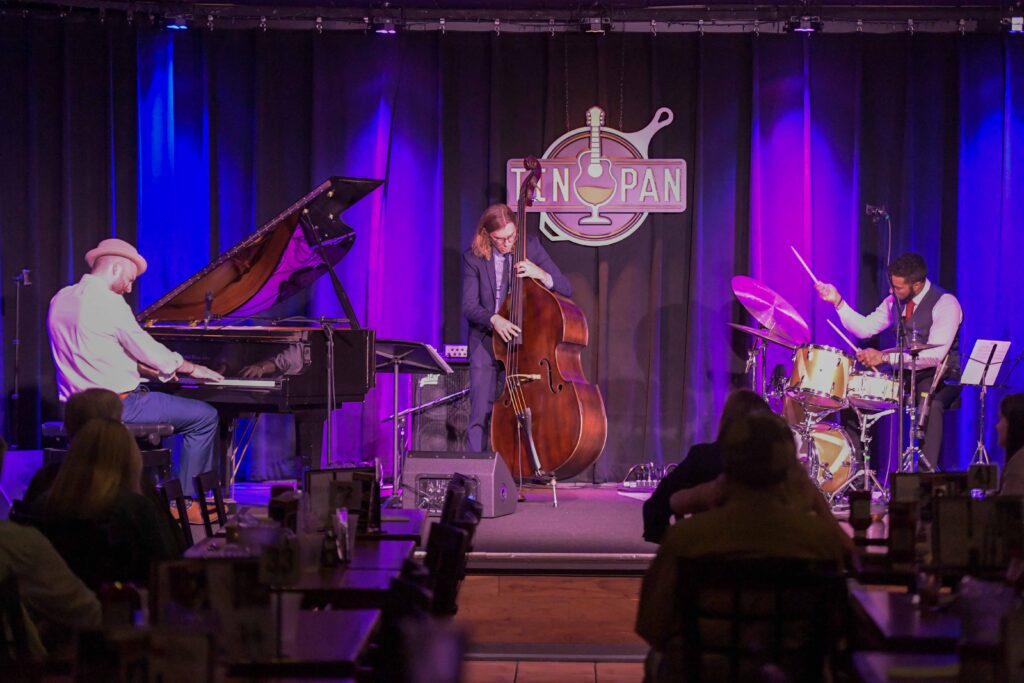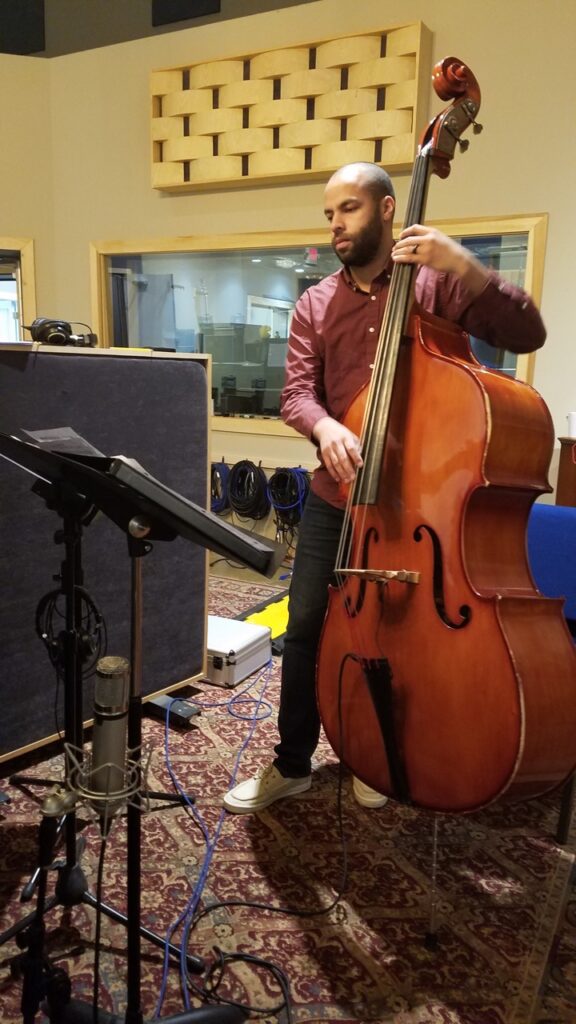20 great ways a jazz musician can earn part-time to full-time income
by Quentin Walston
Being a musician in the 21st century is immensely difficult. There is limitless competition between artists vying for listeners’ attention, struggles to find live venues who treat artists fairly, distractions and other forms of entertainment, a constantly shifting music industry, and not to mention the challenge of creating amazing music. And if that’s not enough, there is the challenge to navigate your career in the field of jazz, a genre that has suffered in popularity (though we at This Is Jazz are seeking to change that!)
Well, my aspiring musical reader, there actually are many ways to earn a living as a jazz musician! I’ve been a full-time, professional jazz musician for a decade and can personally attest to doing most of the items on this list. A professional musician is someone who has multiple streams of income coming through many skills. You will find the descriptions below with real-world rates you could expect to earn should you pursue that route.
Performer
The main way jazz musicians make money, and most often want to earn their living, is through performance. There is a wide variety of performance types for all levels of jazz musician, from the novice or hobbyist, student, mid-tier player, or seasoned professional.
As a performer you can either be a band leader/soloist, or a member in someone else’s ensemble (called a “sideman”). As a band leader, you can more control over your schedule, venue selection, repertoire selection, and often get a bigger cut of the pay. On the downside, booking, promotion, and the overall success of the group rests on your shoulders. As a “sideman”, you can gain important experience under the leadership of a more-established artist. You may not get the autonomy you’d have as a leader, but you do get access to opportunities earlier in your career than you may if you were going at it alone the whole time.
Venue & Performance types
Most people think of being a performer as touring from concert venue to concert venue. In truth, there are many more opportunities for a jazz musician to perform outside of typical concerts.
Wineries/Bars/Restaurants/Resorts
These are great gigs to start getting paid as a musician, to hone your sound & repertoire, and build up your musicianship. Be warned that you will likely be background music, or at least competing for people’s attention among TVs, alcohol, and conversation. Despite that challenge, it is worth doing these gigs to build up your presence, skills, and fanbase.
Earning potential: $75-$500+ per gig
Concerts & Jazz Clubs
A steady income from ticketed concerts and shows is the most difficult to attain as a jazz musician. Jazz clubs and performing arts centers have limited slots to fill. The competition is tough, and you must have a lot of skill, stage presence, and a following to fill seats. You also should expect to pay for your own marketing. Nothing frustrates a venue more than an artist who books a gig and does little to promote the show, simply expecting people to come see them.
Earning potential: $0-$1,000+ per gig

Festivals
Jazz festivals are very competitive. Also, the is an unfortunate trend of jazz festivals hiring pop, rock, and rap artists to increase their draw. While that may be good for their bottom line, it is not good for genuine jazz fans, or jazz musicians hoping to perform at a festival. If you can secure a festival date, they can be a lucrative source of income, and they generally pay for your travel and accommodation. If you’ve never played a jazz festival, search for small, local festivals (usually hosted by city governments). Do not go for big names like Montreal, DC, Newport, etc.
Earning potential: $500-$5,000 (this depends on your following and whether you are a soloist or a band)
Corporate Gigs & Agency Gigs
When people think of a booking agent, they often think of having someone who’s going to get them in at Birdland, the Kennedy Center, or some illustrious concert. In truth, most agencies hiring musicians for private events. This also gives you access to some of the highest paying gigs, especially without the need of a huge following.
Events agencies hire jazz bands for events like weddings, corporate parties, cocktail hours, rehearsal dinners, benefit, non-profit events, etc. These types of events pay very well and you are guaranteed by contract to receive pay!
Avoid agencies that have exclusivity agreements (meaning you can’t take gigs from other firms). By booking with multiple agencies and booking shows yourself, you can have a very busy performance calendar! I am on the roster of four different agencies, allowing me access to a wide variety of lucrative events.
Earning potential: $250-$5,000 per gig (this depends on whether you are a soloist or a band)
Grants & Arts Councils
Sometimes overlooked, sometimes too daunting to approach, is the world of grant money. I agree that grants are hard to write, and there is a specific language and writing style that grant readers are looking for in applications. Furthermore, small artists have a hard time accessing money from huge funds like the National Endowment for the Arts. It is worth, however, pursuing grant funding as it generally pays much higher than for-profit venues, and you will often find audiences very warm to jazz and the arts.
One of the best ways I have found to access grant funding is through State and Local Arts Councils who have already received grant and government funding for the arts. These groups have money already set aside to teach artists perform, teach, tour, or create community-oriented projects. Research what arts councils are close to you, and which areas of funding apply to you. For me, I have received grant funding to guest-teach in schools, to present jazz concerts and seminars in performing arts centers, as well as perform in major cities.
Earning potential: $500-$5,000 per gig (some engagements are multi-day)
Other performer avenues for a jazz musician
Jazz musicians can earn an income in other performance-based ways.

Studio musician
If you are a great sight reader, and can play your instrument confidently and solo with few mistakes, you could be a great studio musician. The hourly rate for a studio musician is comparable to the top rate of teaching one-on-one lessons. You need to be a master of multiple styles of music. Rarely do studio musicians just play jazz; have skills in rock, country, and blues.
Earning Potential: $60-$100/hr
Military band
Military bands are among the few careers options for musicians that have job security, steady pay, and benefits. Each branch of the US military has a jazz band (such as the Air Force’s “Airmen of Note”). These are big bands that play engagements throughout the country (sometime internationally). There is fierce competition to secure a position as many members hold a chair for years, even decades.
Know that military band musicians are considered serving members of the armed forces, so you would need to be physically eligible for military service, and must complete basic training.
Earning Potential: $67,000-$78,000+ per year
Cover Bands & Other Genre Bands
Wedding bands, cover bands, and bands of other genres (rock, blues, etc) hire jazz musicians due to a jazz musicians skills at improvisation and ability to play challenging music proficiently. I know many jazz musicians who work in multiple groups, some jazz, some not. Being in a wedding band or cover band can be a great opportunity to play live, widen your skillset, and contribute to your income.
Earning Potential: $75-$500+ per gig (the higher end of this pay scale is for successful, high-paying bands)
Teacher
Education is a wonderful way to make money as a jazz musician. Teaching music inspires children, provides creative outlets, and gives them lasting skills in goal setting, time management, discipline, and communication. Also, jazz education specifically helps preserve this wonderful music!
There is an incorrect view and attitude of music teachers, summed up by the phrase “those who can’t do, teach”. The idea is if you fail at being a famous musician, all you’re left with is to settle into teaching. This is wrong. Famous musicians have always been teachers, they often supplement performance with teaching, or have different seasons of their career where teaching may take a greater or lesser role. For instance, all of these musicians have spent considerable time teaching: Mozart, Beethoven, Chick Corea, Barry Harris, Charles Mingus, Jason Moran, and more!
Teaching music can look like many things, from being an elementary school teacher to giving masterclasses at the University level. Here is a breakdown of the most common.
Member of a large studio
This (and the entry below) are teaching models based on one-on-one (sometimes called private) lessons.
Being a teacher of a larger music studio has the benefit of an existing student/client base, other teachers to learn from, and often a library of music resources. Generally, you can teach at a studio with a bachelor’s degree in music. Exceptions can even be made without a music degree if you display a high level of expertise, experience, and teaching ability. Most of these types of lessons are 30-60 minutes, a wide variety of ages, and typically “after-school” hours. Downsides to this teaching model are less scheduling freedom and a far lesser pay rate due to the company/studio taking their cut.
I spent about five years teaching at a wonderful music school in Northern Virginia and built up my skills, familiarized myself with a wide variety of teaching materials, and had the chance to create my own classes and lead ensembles!
Earning potential: $20-$40+ an hour

Your own studio
This teaching model has all the elements above, but you are the business owner. Perks are that you receive 100% of the lesson tuition, you can set your own schedule, and teach out of your home (if you prefer). Drawbacks are that you pay for your teaching materials, you must do all of the invoicing, scheduling, accounting, and other work involved in running a lessons business.
Some jazz musicians have only a couple of regular students, some work at it full time with dozens of students! I myself have run my own studio for years and have fluctuated in my studio size.
Earning potential: $50-$100/hr
Online teacher
This is very similar to the heading above on having your own private studio. The main difference is you teach online. For this, ensure you have a good internet connection, microphone, camera, and video conference software. I have unfortunately been dissatisfied with the audio quality of many leading companies in video conferencing, so do some research & tests ahead of time. You will also need a secure method of accepting payment.
Earning potential: $50-$100/hr
Assemblies, Workshops, & Masterclasses
These are great options for musicians who are outgoing and enjoy performing as well as public speaking. This type of work is usually secured through networking, as opposed to cold-calls and cold-emailing. The pay can widely vary depending on whether or not funding comes from grants or school (or organization) budgets.
Earning potential: $200-$1,000+ per gig
Public & private schools
Big band jazz is alive and well in schools! The primary way students of middle school and high school age are exposed to playing jazz is through jazz band classes. Most schools have a jazz band either as an elective class, a club, or an extracurricular that meets before/after school. A public-school teacher has job security, steady income, and benefits. You need a teaching license and (often) a degree in Music Education. School teachers will not only teach jazz. You will teach brass/wind band, and possibly other music classes such as Music Theory, Orchestra, Marching Band, etc.
Earning potential: $38,000-$70,000 per year depending on location, position, and qualifications
University
Many notable jazz musicians have been full-time or part-time teachers at the university level. It is a chance to dive in deep to this music and teach students that are incredibly passionate about jazz. Many colleges around the globe offer jazz degrees, and even those that don’t often have jazz bands or appreciation classes.
With all of the programs and schools out there, Academia is still a highly competitive job field. It is almost assumed that music school professors have a doctorate, though it is not unheard of for a faculty member to have up to a master’s degree. Rarely do Universities higher educators with a bachelor’s degree or lower; exceptions are usually made for notable jazz masters who have proved their expertise through their important contribution to jazz as a whole (ex. Joe Lovano teaches at Berklee).
Earning potential: Adjunct (part-time) professor $60-$70/hr. Full-time $60,000-$100,000+ per year.
Sell educational materials
Many musicians supplement their income with courses, pdfs, e-books, print books, and other materials relating to education. It is difficult to make enough sales to earn a full-time income unless you dedicate a lot of time into building a business around your products, so for many artists it can be a way to get a couple hundred bucks more a month. Some artists use existing platforms while others sell on their own website. To sell courses effectively, you must learn digital marketing tactics and generally be active on social media, utilize email lists, and often run digital ads.
Earning potential: $50-$500+ per month
Composition & more
Creating new music is necessary for any artform to flourish! There are real ways to earn money as a composer, arranger, and transcriber. I have experience in each of these areas and can attest that it is possible not only to make it happen in the modern music industry, but you can do it specifically in jazz.
Composer
Composition is a wide spectrum. Writing the music on your own album, writing the theme for a podcast, writing middle school jazz band charts, and much more fall under the purview of composing professionally. Of the many composition jobs, some can be done part-time, and few can be done full-time. If you are interested in composition, research the various field that interests you, and start building a portfolio! If you are going the advertising or film route, there is a complex system of royalties, pay rates, and more to navigate.
Earning potential: royalty earnings; or $20-$100+/hr; or flat fee contracts $100s-$1,000s per song or project (depending on complexity, length, and instrumentation).

Arranger
An arranger is similar to a composer, as are the earning opportunities. Common income-earning jobs are arranging for professional bands, student-level bands, and student-level lesson/method books. Since arranging often works with others’ compositions, you will rarely make the same level of royalty earnings as if you owned the composition outright. If this is something you are interested in, I would start small with the connections you have: see if an old teacher, local high school/middle school would be willing to give you a shot!
Earning potential: royalty earnings; or $20-$75+/hr; or flat fee contracts $100s-$1,000s per song or project (depending on complexity, length, and instrumentation).
Transcriber
Transcription involves listening to music and writing down what you hear. This is mostly used by students and musicians to increase their improvisational skills, but it can be used to earn money. Musicians may be hired to transcribe famous recordings for sheet music publications (such as the “Charlie Parker Omnibook” or Duke Ellington originals whose original manuscripts have been lost).
Earning potential: $20-$75+/hr depending on the piece’s complexity & instrument density
Spotify & other royalties
You likely know this, but little to no artists are making a substantive living on Spotify or streaming royalties. Big names in streaming often pay $.003 per stream, sometimes even less! Unless you have a steady monthly listenership in the tens to hundreds of thousands, I wouldn’t put your hopes in royalties being your ticket to financial freedom!
That being said, it is good to ensure you are set up to maximize whatever royalties DO come your way. Make sure you are not only set up to receive streaming royalties through your distributor (like Distrokid or CDbaby), but also sign up with the MLC and SoundExchange to get the additional royalties that you are legally entitled to. If you write and publish your own original compositions, register them with a performing rights organization (PRO) like ASCAP or BMI to get royalties for your original work on the radio, television, live performances, etc.
Earning potential: $0-$100s per month
Influencer
In today’s age of social media, we see influencers almost daily. We also hear stories of wildly rich influencers (like Mr. Beast) who have millions of dollars, product endorsements, and more simply from their online activity. What the vast majority of people don’t know, is this is not typical for most people whose followership numbers would label them an “influencer”. Some platforms pay you for viewed content, some don’t, and many pay slim margins (such as the Spotify royaltees above.) For instance, an Instagram reel with tens of thousands of views may pay out about $10. For most people, getting their reel view tens of thousands of times would be amazing! But it usually isn’t something that earns life-changing money.
Influencers can also make money through “branding” or “sponsored content”. This is where a company pays you to make content featuring their company’s product or service. In my experience (as an influencer with over 200,000 followers), sponsored content doesn’t perform as well with followers, and companies in the music industry (especially the jazz industry) don’t have the biggest budgets to work with.
The most important thing being an influencer affords you is an audience to market your own products/services. Do not rely on a platform’s algorithm for your main source of income. Rather, build your community, create valuable music/products/services, and learn how to market and sell to that community. Being an influencer serves you better as a digital marketing expert, rather than a passive royalty recipient. This means your income as an influencer is actually from selling your albums, merch, educational materials, etc., rather than a platform or company paying your for content views.
Lastly, being an influencer is difficult! It’s something to do on top of your music career and you need skills in video editing and the discipline for consistent output. If you’re up for it, go for it!
Earning potential: $0-$100s per month (exceptional cases up to $1,000s per month)
Conclusion
I hope you see that there are many ways to earn a living as a jazz musician! Stick to your passion, work hard, and don’t be afraid to navigate and try many of these models!